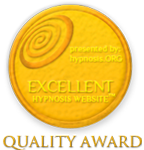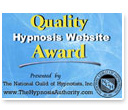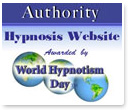
by Nikki Cassar
In this, the second part of my column on working with children, I am going to concentrate on the age bracket of 0-5 years old. If you read my first column, back in October, you will remember that I do not recommend doing hypnosis with children before the age of 5 (unless the child is exceptionally mature). I do not normally work with any child younger than 5, but I often give free phone/email advice to parents who contact me, or to existing clients who have a problem with their child and ask me if have any suggestions.
Alternatively, if the inquiry relates to a child of around 3-4, I do sometimes suggest that the parent (alone or with the child) comes in to see me for a session to learn how to do EFT, for which I charge a modest fee, and then explain to them how to work with their little one, using a simplified form of EFT, and allowing the child to supply their own ‘success’ phrase (for example: ‘Even though I don’t like the dark, I know I’m the prettiest princess in the whole wide world!’). I usually suggest this is done at bedtime, when we know that children are highly suggestible, and should be set up as something which is fun and enjoyable – even better than a bedtime story! In that way, the child learns to look forward to the session, and also benefits from the total attention of his/her parent for 10 minutes or so.
A perfect example of this was a highly intelligent complementary hypnotist whose little 4 year old boy had never been able to have a bowel movement either on a potty or the toilet. I don’t know what was the root cause, but the mother said that her husband had been very impatient with the little boy on a number of occasions when waiting for him to ‘perform’. Undoubtedly this would have distressed the little chap, and would have increased the chances of failure. We did one session together, and then she went away and did EFT with him every night, working with anything and everything that came up. After three weeks, she rang me in despair, saying it hadn’t worked, although his confidence had improved hugely! I encouraged her to continue, and we talked through the various aspects she could tap on with him. About two weeks later, she rang me and said her little boy wanted to speak to me on the phone. A very excited voice said ‘I just did a poo in the toilet!!!!!’ Apparently, he was having his evening bath, and while his mum popped out of the room for a minute, he hopped out of the bath, sat on the toilet, then got back into the bath again. (Note from this that it is important to explain to the parent that patience and consistency are key to the success of this process.)
But let’s now go back a lot further. Any client who is pregnant or likely to become pregnant can be educated to understand the necessity for a pregnancy that is as stress-free as possible. They will probably be shocked to hear that the fetus in the womb becomes increasingly aware of how she (and, to a more limited extent, the father) is feeling. Specialists in the field of prenatal psychology have shown that babies are sensitive, intelligent, receptive and extremely vulnerable well before birth. Marie Mongan, founder and creator of Hypnobirthing® teaches her students to tell their clients to discourage friends and family from saying anything negative, either about the baby or the birth, but instead to say something along the lines of ‘Careful – my baby is listening!’ Those of us who are certified 5-Pathers will have experienced a large percentage of our clients apparently regressing back into the womb, and being very aware of the mother’s feelings or thoughts, resulting in an ISE (Initial Sensitizing Event) where the baby started a negative belief system, eventually leading to the adult issue they have presented with.
In her wonderful book ‘Tears and Tantrums, What To Do When Babies And Children Cry’, Aletha J. Solter Ph.D. writes ‘Birth itself can be a painful, confusing and frightening experience for infants, and contribute to later emotional and behavioral problems. The major kinds of birth trauma are being drugged, removal by forceps, Cesarean delivery, and prolonged labor or oxygen deprivation.’ She goes on to say ‘Babies whose mothers experienced a difficult delivery cry more than babies whose mothers had a less stressful one. One study showed that crying in babies was greater if there had been obstetrical interventions and if the mother had felt powerless in the process.’ Clients can be encouraged to undergo hypnosis during pregnancy to increase the chances of a comfortable birth, which will result in a healthier, happier and more emotionally-balanced baby. There are many very good courses you can attend to learn how to help your clients achieve a comfortable birth, but as someone who personally did Marie Mongan’s training in the Hypnobirthing® process, I would highly recommend it. If this is not an area you wish to pursue, then you can refer your client on to a qualified practitioner in your area.
Once the baby comes into the world, it is important that bonding with the mother is done as quickly as possible. Most hospitals now recognize the importance of this, and will lay the baby on the mother’s chest or stomach immediately after birth, before the cord is cut. Unfortunately, where there are complications requiring immediate medical intervention, the baby is sometimes whisked away, and it may be several hours, even days or weeks, before the mother is able to hold the baby in her arms. This can very often lead to abandonment issues, and the baby and young child may be very clingy/fearful/nervous/lacking in confidence. Aletha Solter writes ‘A second source of stress during infancy is unfilled needs, specifically those for being touched and held. The first nine months after birth are considered a critical period for the need for physical contact. Babies develop best when caretakers adequately fill this need.’
Moving on now to how we can help our clients with their toddler-age children. Most people are surprised to learn that the worst thing we can do is to tell our kids what we don’t want them to do or say or feel. You can educate the parent to tell the child what they do want instead, knowing that they will get much better results. When young children misbehave, it is very often because they are striving for attention. In his highly-recommended book ‘Raising Your Children With Hypnosis’, Donald J. Mottin FNGH says ‘You cannot reason with a two-year-old. Sometimes bad behavior is the only way they know how to communicate because they get a reaction. It works, so they continue to do it.’ He explains that a toddler who has learned to bite in order to get their message across will not benefit from being given ‘time out’. Instead, he recommends that we need to get down on their level, look the child in the eye and in an authoritative voice say ‘Stop – no biting!’ By looking them in the eye, you have their attention. By telling them in short, specific terms what you want, they will learn.
When a young child misbehaves, it is important for the parent to realize he or she has a problem, and to take a close look at the situation and try to understand what the child is trying to communicate. So in addition to telling them what you want, you can also acknowledge that you understand what their problem is. A child who feels understood and heard will respond more readily, and one of the pitfalls of the busy lifestyles people have, often with both parents working, is that children do not always get the time and attention they deserve. They don’t know how to communicate this verbally, so will very often resort to unreasonable behavior as being the only way they do know. Don Mottin believes that consistency is the key, and that children need to know that if they choose a certain action, that the consequences will always be the same. As long as parents stick with the rules they have set, the child will learn that they are accountable for their own action, and it will help them to adjust to the outside world, so that when they go to school or work, they will realize the world doesn’t revolve around them.
Aletha Solter holds regular workshops on babies and children crying, which she has so far presented in eight countries. She teaches that babies and young children need to cry, and should never be soothed (‘Hush, there there, don’t cry’) or made to believe that crying is bad (‘Don’t be a cry baby’ ‘Big boys/girls don’t cry’. Punishing, threatening, withdrawing love or attention, isolating the child.) She says that children who cry enjoy several benefits. They show improved emotional health, a healthier attachment to adults, higher self-esteem, are easier to live with, and have better learning ability.
Instead of using any form of repression, and providing that all immediate needs have been filled, she recommends that the crying baby should be held calmly in the parent’s arms and just allowed to cry, without any soothing or jiggling. You can say something along the lines of ‘I love you. I’m listening. You’re safe with me. It’s okay to cry.’ Aletha suggests using gentle touch on the baby’s arms or face to reassure him or her of your physical presence, and not to be surprised if this causes louder crying than before. Eventually, the baby will stop crying and will seem much happier and more peaceful.
When young children cry, she stresses that the first step in any situation is to do whatever possible to remove the source of the hurt. Once as much as possible has been done to remove the source of stress, she says that the next step in any crying situation is to listen to the child and accept the crying. It is not always necessary to pick up and hold children past infancy when they cry, but they always benefit from aware attention. Children need to know that they are loved, no matter what they are feeling. They need to express their painful feelings without being rejected or distracted, and to know that somebody understands and cares. In his acclaimed book ‘P.E.T. Parent Effectiveness Training’, Dr. Thomas advocates ‘Active Listening’ – i.e. acknowledging children’s emotions by stating simple, without analyzing or judging, what you think they are feeling.
Not only can you, the hypnotist, use all of this information to teach your grateful clients how to help their children, but it may also be useful to you when working within your practice. A simple question in the first session, such as ‘When you were a small child, how did your parents react to you crying?’ can elicit some very important and helpful information! Also, asking more general questions about how they were disciplined in childhood, how much time they spent with their parents, did they feel listened to, will also give you some clues to your client’s current issue.
In my next article, I will be moving on to talk about how we can best help children in the 5-10 age range. In the meantime, I would like to wish all of you a very happy, healthy and abundant 2007!






